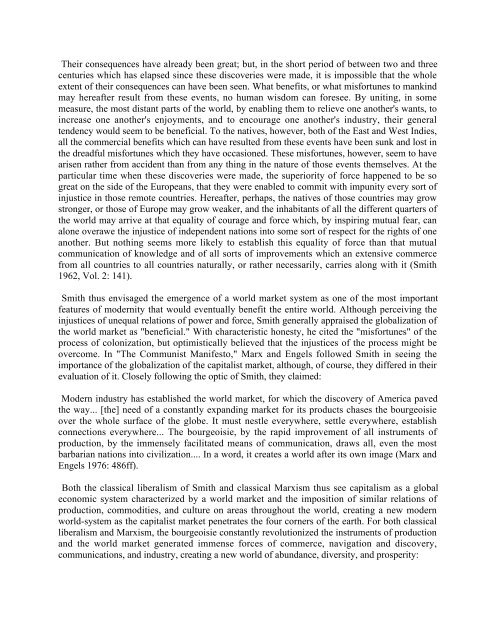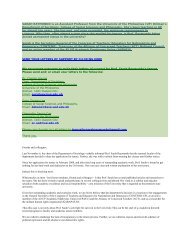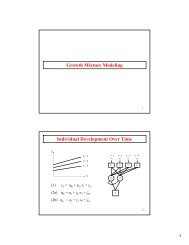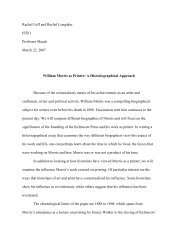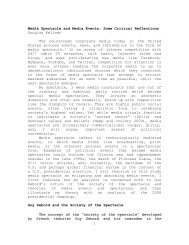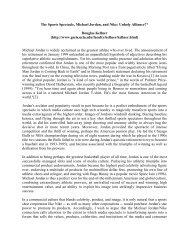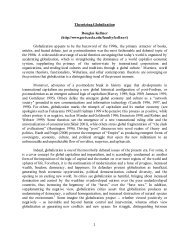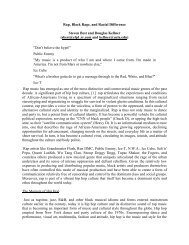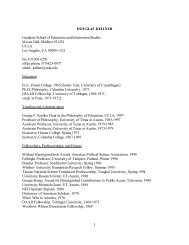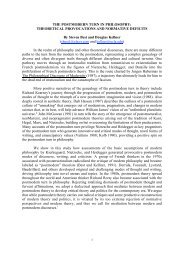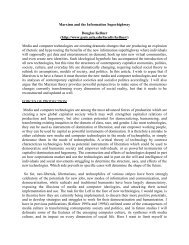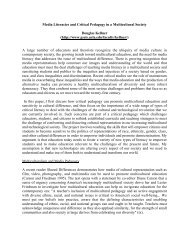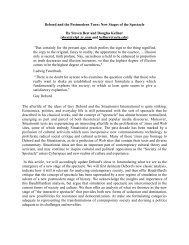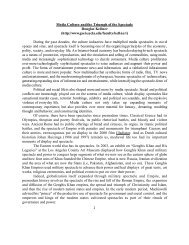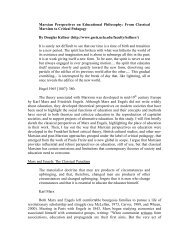Globalization and the Postmodern Turn By Douglas Kellner ... - UCLA
Globalization and the Postmodern Turn By Douglas Kellner ... - UCLA
Globalization and the Postmodern Turn By Douglas Kellner ... - UCLA
Create successful ePaper yourself
Turn your PDF publications into a flip-book with our unique Google optimized e-Paper software.
Their consequences have already been great; but, in <strong>the</strong> short period of between two <strong>and</strong> three<br />
centuries which has elapsed since <strong>the</strong>se discoveries were made, it is impossible that <strong>the</strong> whole<br />
extent of <strong>the</strong>ir consequences can have been seen. What benefits, or what misfortunes to mankind<br />
may hereafter result from <strong>the</strong>se events, no human wisdom can foresee. <strong>By</strong> uniting, in some<br />
measure, <strong>the</strong> most distant parts of <strong>the</strong> world, by enabling <strong>the</strong>m to relieve one ano<strong>the</strong>r's wants, to<br />
increase one ano<strong>the</strong>r's enjoyments, <strong>and</strong> to encourage one ano<strong>the</strong>r's industry, <strong>the</strong>ir general<br />
tendency would seem to be beneficial. To <strong>the</strong> natives, however, both of <strong>the</strong> East <strong>and</strong> West Indies,<br />
all <strong>the</strong> commercial benefits which can have resulted from <strong>the</strong>se events have been sunk <strong>and</strong> lost in<br />
<strong>the</strong> dreadful misfortunes which <strong>the</strong>y have occasioned. These misfortunes, however, seem to have<br />
arisen ra<strong>the</strong>r from accident than from any thing in <strong>the</strong> nature of those events <strong>the</strong>mselves. At <strong>the</strong><br />
particular time when <strong>the</strong>se discoveries were made, <strong>the</strong> superiority of force happened to be so<br />
great on <strong>the</strong> side of <strong>the</strong> Europeans, that <strong>the</strong>y were enabled to commit with impunity every sort of<br />
injustice in those remote countries. Hereafter, perhaps, <strong>the</strong> natives of those countries may grow<br />
stronger, or those of Europe may grow weaker, <strong>and</strong> <strong>the</strong> inhabitants of all <strong>the</strong> different quarters of<br />
<strong>the</strong> world may arrive at that equality of courage <strong>and</strong> force which, by inspiring mutual fear, can<br />
alone overawe <strong>the</strong> injustice of independent nations into some sort of respect for <strong>the</strong> rights of one<br />
ano<strong>the</strong>r. But nothing seems more likely to establish this equality of force than that mutual<br />
communication of knowledge <strong>and</strong> of all sorts of improvements which an extensive commerce<br />
from all countries to all countries naturally, or ra<strong>the</strong>r necessarily, carries along with it (Smith<br />
1962, Vol. 2: 141).<br />
Smith thus envisaged <strong>the</strong> emergence of a world market system as one of <strong>the</strong> most important<br />
features of modernity that would eventually benefit <strong>the</strong> entire world. Although perceiving <strong>the</strong><br />
injustices of unequal relations of power <strong>and</strong> force, Smith generally appraised <strong>the</strong> globalization of<br />
<strong>the</strong> world market as "beneficial." With characteristic honesty, he cited <strong>the</strong> "misfortunes" of <strong>the</strong><br />
process of colonization, but optimistically believed that <strong>the</strong> injustices of <strong>the</strong> process might be<br />
overcome. In "The Communist Manifesto," Marx <strong>and</strong> Engels followed Smith in seeing <strong>the</strong><br />
importance of <strong>the</strong> globalization of <strong>the</strong> capitalist market, although, of course, <strong>the</strong>y differed in <strong>the</strong>ir<br />
evaluation of it. Closely following <strong>the</strong> optic of Smith, <strong>the</strong>y claimed:<br />
Modern industry has established <strong>the</strong> world market, for which <strong>the</strong> discovery of America paved<br />
<strong>the</strong> way... [<strong>the</strong>] need of a constantly exp<strong>and</strong>ing market for its products chases <strong>the</strong> bourgeoisie<br />
over <strong>the</strong> whole surface of <strong>the</strong> globe. It must nestle everywhere, settle everywhere, establish<br />
connections everywhere... The bourgeoisie, by <strong>the</strong> rapid improvement of all instruments of<br />
production, by <strong>the</strong> immensely facilitated means of communication, draws all, even <strong>the</strong> most<br />
barbarian nations into civilization.... In a word, it creates a world after its own image (Marx <strong>and</strong><br />
Engels 1976: 486ff).<br />
Both <strong>the</strong> classical liberalism of Smith <strong>and</strong> classical Marxism thus see capitalism as a global<br />
economic system characterized by a world market <strong>and</strong> <strong>the</strong> imposition of similar relations of<br />
production, commodities, <strong>and</strong> culture on areas throughout <strong>the</strong> world, creating a new modern<br />
world-system as <strong>the</strong> capitalist market penetrates <strong>the</strong> four corners of <strong>the</strong> earth. For both classical<br />
liberalism <strong>and</strong> Marxism, <strong>the</strong> bourgeoisie constantly revolutionized <strong>the</strong> instruments of production<br />
<strong>and</strong> <strong>the</strong> world market generated immense forces of commerce, navigation <strong>and</strong> discovery,<br />
communications, <strong>and</strong> industry, creating a new world of abundance, diversity, <strong>and</strong> prosperity:


